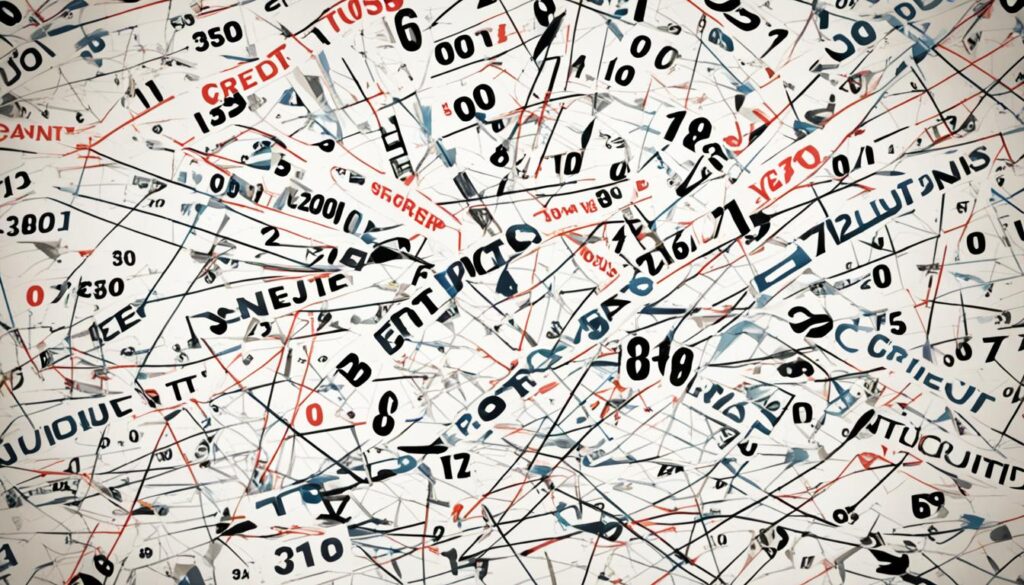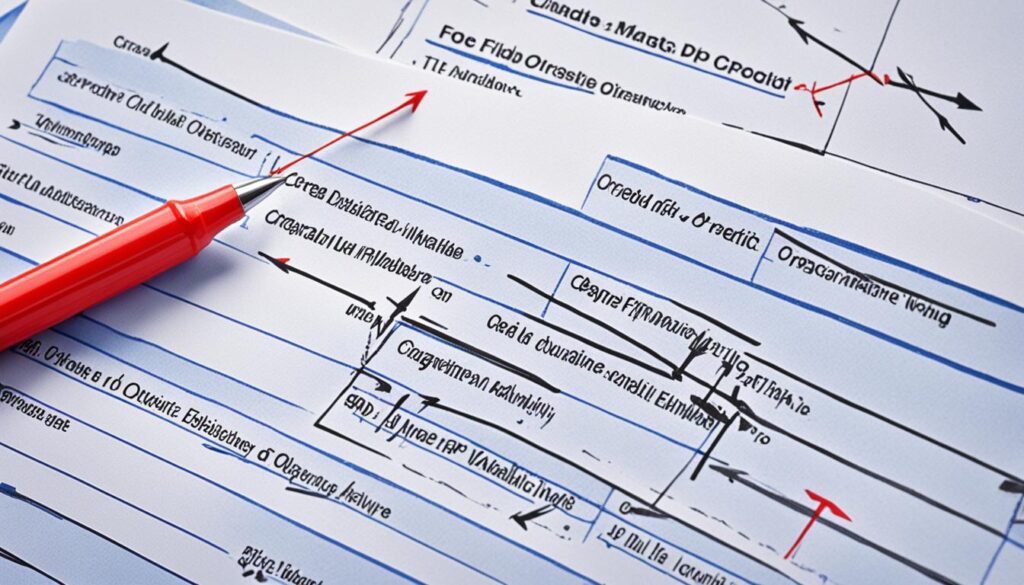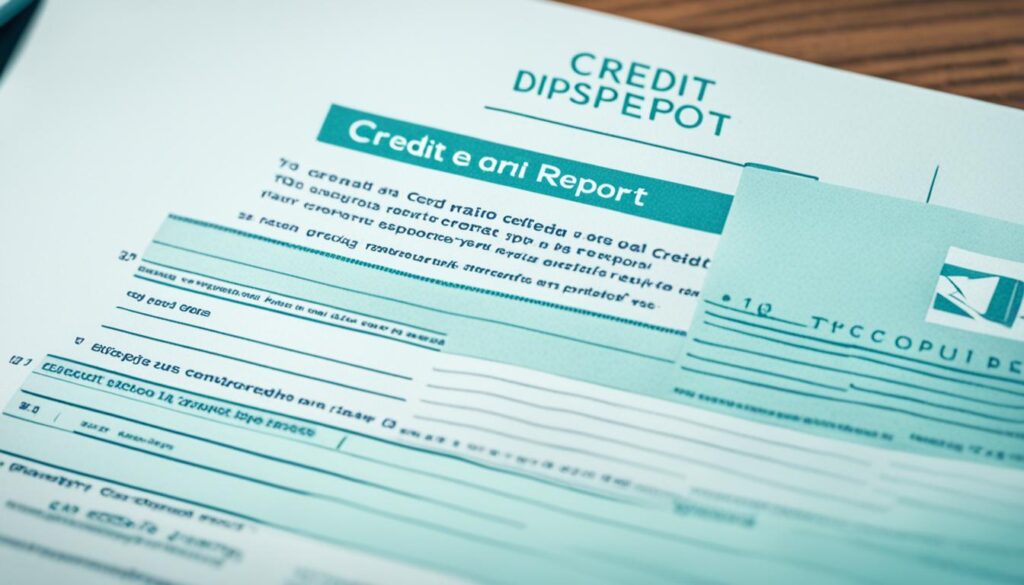Maintaining a healthy credit profile is crucial in today’s financial landscape, but even the most diligent consumers can find inaccuracies on their credit reports. Fortunately, the Fair Credit Reporting Act (FCRA) provides you with the right to dispute any errors or discrepancies on your credit report. This comprehensive guide will walk you through the step-by-step process of filing a credit dispute letter to protect your rights, correct errors, and improve your credit score.
Key Takeaways
- Understand the purpose and your rights under the Fair Credit Reporting Act (FCRA) when disputing credit report errors.
- Identify common credit report errors that you can dispute, including incorrect account information, fraudulent activities, and outdated data.
- Learn the essential components to include in your credit dispute letter and the supporting documentation required.
- Explore the pros and cons of disputing credit report errors by mail, as well as alternative methods like online and phone disputes.
- Discover the typical timeline for resolving a credit dispute and how the process can impact your credit score.
What Is a Credit Dispute Letter?
A credit dispute letter is a formal written communication sent to credit reporting agencies, such as Experian, Equifax, and TransUnion, to inform them of inaccuracies or incomplete information on your credit report. The primary purpose of a credit dispute letter is to initiate an investigation into the disputed item and have it corrected or removed from your credit file.
Understanding the Purpose of a Credit Dispute Letter
Your right to dispute information on your credit report is safeguarded by the Fair Credit Reporting Act (FCRA), which grants you the ability to access your credit reports for free and challenge any details you believe to be inaccurate or incomplete. By submitting a credit dispute letter, you are exercising your FCRA rights to ensure the accuracy and completeness of your credit report information.
Your Rights Under the Fair Credit Reporting Act (FCRA)
- Access your credit reports from the three major credit reporting agencies (Experian, Equifax, and TransUnion) for free once a year
- Dispute any inaccuracies or incomplete information on your credit report
- Have the disputed items investigated and corrected or removed from your credit report in a timely manner
- Receive a free copy of your credit report if a credit report investigation results in a change to your credit report
By understanding your rights under the FCRA, you can effectively use a credit dispute letter to address any credit report inaccuracies and maintain the integrity of your credit history.
What Can I Dispute on My Credit Report?
Your credit report is a crucial document that can impact your financial well-being, from securing loans to renting an apartment. However, credit report errors can and do occur, and it’s important to understand what you can dispute to ensure the information is accurate.
Common Credit Report Errors You Can Dispute
One of the most common credit report errors is the inclusion of accounts that do not belong to you, often due to identity theft. You can also dispute incorrect account information, such as late payments or inaccurate balances. Additionally, errors in your personal information, like an incorrect address, can be disputed.
- Accounts opened fraudulently in your name
- Incorrect account status, such as a bankruptcy that never occurred
- Mixed files where your information is associated with someone else’s
While you cannot dispute accurate negative information on your credit report, such as late payments or a bankruptcy, you can work with your creditors to have them remove or update any errors on your report. Disputing these inaccuracies can help improve your credit score and overall financial health.
“Maintaining an accurate credit report is crucial for your financial well-being. Take the time to review your report and dispute any errors you find.”
Information Not Worth Disputing
When it comes to your credit report, not all information is worth disputing. While you may be tempted to challenge every detail, it’s important to understand the limitations of the credit dispute process. Accurate negative information, such as late payments or collections accounts, typically cannot be removed, even if you have extenuating circumstances.
These types of entries will generally remain on your credit report for the allotted time period, regardless of your efforts to have them removed. However, that doesn’t mean you’re powerless. You can still contact your creditors directly to explain your situation and request they update or remove the information.
“Accurate negative information on your credit report, like late payments or collections, can be difficult to dispute successfully.”
It’s crucial to focus your credit report disputes on identifying and correcting inaccuracies or errors in your report. Disputing accurate negative information is generally a waste of time and resources, as the credit bureaus are unlikely to remove it. By understanding the limitations of the dispute process, you can optimize your efforts and improve the accuracy of your credit report.

- Accurately reported late payments or collections accounts cannot be disputed successfully.
- Focus your efforts on disputing inaccurate or erroneous information on your credit report.
- Contact creditors directly to explain your situation and request updates or removals of accurate negative information.
What Should You Include in a Credit Dispute Letter?
When drafting your credit dispute letter, it’s crucial to include specific personal information and supporting documentation to maximize the chances of a successful resolution. Providing a comprehensive and well-organized dispute letter can help the credit reporting agencies thoroughly investigate your case.
Essential Components of a Dispute Letter
Be sure to include the following key details in your credit dispute letter:
- Your full name
- Date of birth
- Social Security number
- Current and previous addresses
- A copy of a government-issued ID (e.g., driver’s license or passport)
- A copy of a utility bill or bank statement to verify your current address
Supporting Documentation
In addition to your personal information, clearly identify each item you are disputing on your credit report and explain why you believe the information is inaccurate. Provide any relevant supporting documentation that corroborates your claim, such as:
- Copies of payment receipts
- Police reports (in the case of identity theft)
- Other documents that refute the disputed information
Submitting a detailed and well-supported credit dispute letter, along with the necessary personal information and documentation, will help the credit reporting agencies thoroughly investigate your case and resolve any credit report errors.

“Providing a comprehensive and well-organized dispute letter can help the credit reporting agencies thoroughly investigate your case.”
step by step credit dispute letter filing
Disputing credit report errors is a crucial step in maintaining a healthy credit score. The process of filing a credit dispute letter can seem daunting, but by breaking it down into manageable steps, you can effectively address any inaccuracies on your credit report. Let’s dive into the step-by-step guide to credit dispute letter filing.
- Gather the necessary information and documentation. Carefully review your credit report and identify each item you wish to dispute. Collect any supporting documents that can corroborate your claims.
- Clearly explain why you believe the information on your credit report is inaccurate. Be specific and provide a detailed explanation for each disputed item.
- Decide whether to use the credit reporting agency’s dispute form or write your own letter. Either option is acceptable, but drafting your own letter allows you to customize the content and ensure your concerns are fully addressed.
- Mail your dispute letter, along with the supporting materials, to the appropriate address for the credit bureau you are disputing (Experian, Equifax, or TransUnion).
- Keep copies of everything you send for your records, as this will be important for tracking the progress of your dispute.
- The credit reporting agency will then investigate the disputed items and provide you with the results.
By following these step-by-step instructions, you can effectively navigate the credit dispute process and take control of your credit report errors and credit dispute process. Remember, persistence and documentation are key to achieving a successful step by step credit dispute filing.

“Disputing credit report errors is an important step in maintaining a healthy credit score and protecting your financial well-being.”
Pros and Cons of Disputing by Mail
When it comes to disputing credit report errors, mailing a credit dispute letter has its fair share of advantages and disadvantages. Understanding these nuances can help you make an informed decision on the best approach for your situation.
Advantages of Mailing a Credit Dispute Letter
- Creates a paper trail: Mailing a dispute letter provides a tangible record of your communication with the credit bureau, which can be valuable if the dispute escalates or requires further action.
- Allows for supporting documentation: You can include copies of relevant documents, such as billing statements or identification, to substantiate your dispute claims.
- Potential for more thorough resolution: The credit bureau may conduct a more comprehensive investigation when they receive a physical dispute letter compared to an online or phone dispute.
Disadvantages of Mailing a Credit Dispute Letter
While mailing a credit dispute letter has its advantages, it also comes with some drawbacks:
- Slower process: The turnaround time for a mailed dispute can be longer than filing a dispute online or over the phone, as the credit bureau must receive, process, and respond to your letter.
- Increased effort: Preparing and mailing a physical dispute letter requires more time and effort on your part compared to other dispute methods.
- Potential for lost or misplaced documents: There is a risk that your dispute letter or supporting documents could be lost or misplaced in the mail, which could delay the resolution of your dispute.
Ultimately, the decision to dispute by mail or through alternative channels depends on your personal preferences, the urgency of the situation, and the complexity of the errors on your credit report. Weighing the advantages of mailing a dispute letter against the disadvantages of mailing a dispute letter can help you determine the most suitable approach for your credit dispute needs.

Where to Mail Your Dispute Letter
If you’ve discovered errors on your credit report and decide to dispute them by mail, it’s crucial to send your dispute letter and supporting documents to the correct mailing addresses for each of the three major credit bureaus: Experian, Equifax, and TransUnion.
Experian Mailing Address
For Experian, the mailing address is:
Experian
P.O. Box 4500
Allen, TX 75013
Equifax Mailing Address
The mailing address for Equifax is:
Equifax Information Services LLC
P.O. Box 740241
Atlanta, GA 30374
TransUnion Mailing Address
For TransUnion, the mailing address is:
TransUnion Consumer Solutions
P.O. Box 2000
Chester, PA 19016-2000
To ensure your dispute letter reaches the credit bureaus and creates a paper trail, be sure to send it by certified mail with a return receipt. This will provide you with proof of when the credit bureaus received your dispute.
How Long Does It Take to Have the Dispute Resolved?
The credit dispute resolution timeline can vary when it comes to resolving a credit report dispute. According to the Fair Credit Reporting Act (FCRA), credit reporting agencies must investigate and respond to credit disputes within 30 days. However, the actual time it takes to resolve a dispute can depend on several factors.
The credit reporting agency investigation process involves the agency contacting the information furnisher, the company that reported the disputed item. The furnisher must then investigate the disputed item and report back to the credit bureau. Once the investigation is complete, the credit bureau will provide you with the results and any updates to your credit report.
The complexity of the issue and the responsiveness of the information furnisher can impact the credit dispute resolution timeline. Some disputes may be resolved more quickly, while others may take longer due to the need for additional research or communication between the parties involved.
It’s important to note that the FCRA requirements mandate credit reporting agencies to complete their investigation and provide you with the results within 30 days. In some cases, they may be granted an additional 15 days if they need more time to thoroughly investigate the dispute.
“The credit reporting process can be complex, but understanding your rights and the timeline for resolving disputes can help ensure a fair and timely resolution.”
Regardless of the specific timeline, it’s crucial to follow the proper steps and provide all necessary documentation when filing a credit dispute. By doing so, you can increase the chances of a successful resolution and maintain the accuracy of your credit report.
Other Ways to Dispute Your Credit Report
While disputing credit report errors by mail is a common approach, there are alternative options available to consumers. Many credit reporting agencies, including Experian, Equifax, and TransUnion, offer online dispute filing through their websites. This can be a faster and more convenient method, as the process is typically completed within 30 days. Additionally, you can dispute credit report information by phone, calling the number listed on your credit report to get the process started.
Online Dispute Filing
The online dispute filing process allows you to submit your credit dispute directly through the credit bureau’s website. This method is often preferred for its efficiency and transparency, as you can track the status of your case and receive updates throughout the investigation.
Phone Dispute Filing
For those who prefer a more personal approach, disputing your credit report information by phone can be a viable option. Simply call the number listed on your credit report to initiate the process and work with a customer service representative to address any inaccuracies.
Both online and phone dispute options provide consumers with alternative methods to the traditional mail-in credit dispute letter. These alternative dispute methods can offer a more streamlined and timely resolution to credit report issues, empowering individuals to take control of their financial well-being.
| Dispute Method | Advantages | Disadvantages |
|---|---|---|
| Online Dispute |
|
|
| Phone Dispute |
|
|
Whether you choose to dispute your credit report online, by phone, or through the traditional mail-in method, it’s important to understand your options and select the approach that best fits your needs. By taking proactive steps to address any online credit dispute or phone credit dispute issues, you can work towards maintaining a healthy credit profile and accessing the alternative dispute methods that are most convenient for you.
How Disputing Information Affects Your Credit Score
The process of filing a credit dispute does not directly impact your credit score. However, the outcome of the dispute can significantly influence your score, depending on the nature of the error. If the credit bureau’s investigation reveals that the disputed information is inaccurate or incomplete, and they subsequently remove or update the item, your credit score improvements may be quite substantial.
On the other hand, if the disputed information is found to be accurate, your credit score will remain unaffected. It’s crucial to understand that disputing negative information removal is unlikely to result in its elimination from your credit report, as long as the information is factually correct.
| Scenario | Impact on Credit Score |
|---|---|
| Disputed information is inaccurate or incomplete | Credit score may improve if the item is removed or updated |
| Disputed information is accurate | Credit score will not be affected |
The key takeaway is that the credit dispute impact on credit score is primarily determined by the outcome of the investigation, not the act of filing the dispute itself. By understanding this process, you can strategically address any negative information on your credit report and take the necessary steps to improve your overall credit standing.
“The outcome of a credit dispute can have a significant impact on your credit score, so it’s crucial to address any inaccuracies or errors on your report.”
Conclusion
Disputing inaccurate information on your credit report is a crucial step in maintaining a healthy credit profile and safeguarding your financial well-being. By understanding your rights under the Fair Credit Reporting Act, identifying common credit report errors, and following the step-by-step process for filing a credit dispute letter, you can take control of your credit and work towards improving your credit score.
Whether you choose to dispute by mail, online, or by phone, the key is to remain vigilant and follow up to ensure the issues are resolved in a timely manner. By taking proactive steps to correct credit report errors, you can achieve the credit score you deserve and enjoy the benefits of consumer protection under the FCRA.
Remember, maintaining a healthy credit score is not only important for securing loans, credit cards, and other financial products, but it also plays a crucial role in your overall financial well-being. By staying informed and taking action to address any inaccuracies on your credit report, you can safeguard your financial future and enjoy the peace of mind that comes with having a credit profile you can be proud of.
FAQ
What is a credit dispute letter?
What are my rights under the Fair Credit Reporting Act (FCRA)?
What types of errors can I dispute on my credit report?
What information should I include in a credit dispute letter?
What are the pros and cons of disputing by mail?
Where should I send my credit dispute letter?
How long does it take to have a credit dispute resolved?
How else can I dispute my credit report?
How does a credit dispute affect my credit score?
Source Links
- How to Write a Credit Dispute Letter – NerdWallet – https://www.nerdwallet.com/article/finance/how-to-write-a-credit-dispute-letter-to-fix-credit-report-errors
- How do I dispute an error on my credit report? | Consumer Financial Protection Bureau – https://www.consumerfinance.gov/ask-cfpb/how-do-i-dispute-an-error-on-my-credit-report-en-314/
- How to Write a Credit Dispute Letter – https://www.experian.com/blogs/ask-experian/how-to-write-a-credit-dispute-letter/

